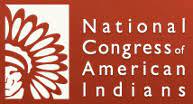The National Congress of American Indians (NCAI) executive board announced iu a statement released on Friday it has decided to conduct its 2022 Executive Council Winter Session in a fully virtual format this year due to the rise in COVID-19 cases across Indian Country. This is the second year in a row, the winter session will be held virtually due to the ongoing COVID-19 pandemic.

The 2022 Executive Council Winter Session take place on Monday, February 14, 2022. The statement said further details will be announced soon regarding the full agenda, how to register, and what to expect.
Want more Native News? Get the free daily newsletter today.
"After much consideration by NCAI’s Administrative Board and Executive Committee, we have decided the most prudent path forward is to conduct this conference in a fully virtual environment," NCAI President Fawn Sharp (Quinault Indian Nation) said in a letter. "While we are disappointed that we are unable to come together in Washington, D.C. during this time, our priority is the health and wellness of Indian Country. In the forthcoming weeks."
Reach out to NCAI's events team at [email protected] for any questions about this announcement.
More Stories Like This
Native News Weekly (August 25, 2024): D.C. BriefsUS Presidents in Their Own Words Concerning American Indians
Native News Weekly (December 28, 2025): D.C. Briefs
Minnesota Lt. Gov. Flanagan Draws Right-Wing Backlash After Wearing Hijab in Solidarity With Somali Community
Haaland Meets with Southern New Mexico Law Enforcement on Public Safety Priorities
Help us defend tribal sovereignty.
At Native News Online, our mission is rooted in telling the stories that strengthen sovereignty and uplift Indigenous voices — not just at year’s end, but every single day.
Because of your generosity last year, we were able to keep our reporters on the ground in tribal communities, at national gatherings and in the halls of Congress — covering the issues that matter most to Indian Country: sovereignty, culture, education, health and economic opportunity.
That support sustained us through a tough year in 2025. Now, as we look to the year ahead, we need your help right now to ensure warrior journalism remains strong — reporting that defends tribal sovereignty, amplifies Native truth, and holds power accountable.
 The stakes couldn't be higher. Your support keeps Native voices heard, Native stories told and Native sovereignty defended.
The stakes couldn't be higher. Your support keeps Native voices heard, Native stories told and Native sovereignty defended.
Stand with Warrior Journalism today.
Levi Rickert (Potawatomi), Editor & Publisher

